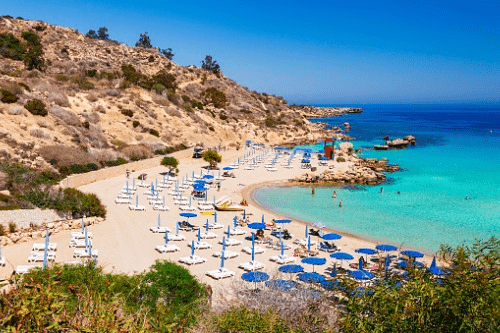Cyprus is not one of the 13 regions of Greece. However, it has intricate cultural ties with Greece so I wanted to include it.
The everyday spoken language of most of the population of Cyprus is Cypriot Greek, and the cuisine is very similar to Greek cuisine – but it has its own unique flair. Sharing Cypriot recipes can only open up even more delicious variations for us to try.
Now, a little bit about Cyprus.
Where is Cyprus?
Cyprus is its own island country. It is located in the eastern part of the Mediterranean, and is the third largest and most populated island in all of the Mediterranean. To the north is Turkey, to the east is Syria and Lebanon, to the south is Egypt and Israel, and to the west is Crete.
The capital city is Nicosia.
This country is divided into two parts:
– the Republic of Cyprus (the southern two-thirds of the island)
– the Turkish Republic of Northern Cyprus (the northern third)
The north is currently under Turkish control. The capital city of Nicosia is divided into two parts, much the same as Berlin was once divided. Interestingly, Nicosia is the last divided capital in Europe.
The United Nations controls the Green Line (a buffer zone that separates the two parts). It stretches for 180 kilometres (112 miles).
The Republic of Cyprus is divided into six districts:
– Famagusta
– Kyrenia
– Larnaca
– Limassol
– Nicosia
– Paphos
What does Cyprus have to offer?
Cyprus has two airports:
– Larnaca
– Paphos
And five ports:
– Larnaca
– Latsi
– Limassol
– Paphos
– Pomos
Agriculture
– Vegetables (carrots, potatoes, tomatoes, cucumbers)
– Legumes
– Fruit (apples, grapes, cherries, lemons, melons, oranges, apricots, peaches)
– Wheat and Barley
– Tobacco
– Meat (cattle, sheep, goats, pigs, chickens)
– Saltwater and freshwater fish farms
– Olives and Olive Oil
– Carob
– Almonds
– Dairy Products (halloumi cheese)
– Wine
Beaches
When it comes to beaches, this island has something for everyone. Over three million visitors come to Cyprus every year, and most of these visitors come looking for a beach holiday.
There are many to choose from – from fine, sandy beaches like the popular Nissi Beach in Ayia Napa, to secluded rocky bays with black sand like Governors Beach in Limassol.
Check out all the beaches Cyprus has to offer – Beaches in Cyprus
Restaurants
Cypriot food is similar to Greek food, so you can readily order things like baklava, moussaka, dolmades, and souvlaki (or souvla). There are also foods that are specific to this country – a couple that come to mind are pourgouri and halloumi.
Pourgouri is similar to bulgar and can be eaten simply by boiling it in broth or water; or by mixing it with flour to make koupes (or kibbeh) – a cigar shaped dough filled with meat, onions, parsley, and spices.
Halloumi cheese is made from cow, sheep, or goat’s milk. It is specific to Cyprus, and is exported to over 30 countries worldwide. This semi-hard cheese has been produced on the island for centuries, and is as popular in Cyprus as feta cheese is in Greece.
In restaurants, you will see halloumi used fresh in salads or alongside fruit. It is also served grilled, fried, or barbequed.
There are many restaurants to choose from that can accommodate all types of budgets and tastes, from traditional tavernas to high end restaurants.
– Famagusta Restaurants
– Kyrenia Restaurants
– Larnaca Restaurants
– Limassol Restaurants
– Nicosia Restaurants
– Paphos Restaurants
Wine
Wine production in has been a major economic product for centuries. In fact, it is thought that winemaking may have existed on this island as many as 6000 years ago. Today, it is best known for its Commandaria wine (an amber-coloured sweet dessert wine).
Here are a few wineries to visit while in Cyprus – 13 Must-Visit Wineries
History
Cyprus has plenty of historical sites, Byzantine churches, Neolithic villages, monasteries, medieval castles, and museums to explore. What’s amazing is how beautifully intact the historical sites have remained throughout the centuries.
Cyprus has a long history. It has been inhabited by the Hittites, ancient Greeks, Assyrians, Persians, Romans, and Ottomans – just to name a few. It’s no wonder, then, that this island has plenty of historical value.
There are three World Heritage Sites in – the city of Paphos, the painted churches in the Troodos region, and the Neolithic settlement of Choirokoitia.
~~~~~~~~~~~~~~~~~~~~~~~~~~~~~~~~~~~~~~~~~~~~~~~~~~~~~~~~~~~~~~~~~~~~~~~~~~
See some of our Cypriot recipes here.
Do you have a recipe from Cyprus that you love? Share it with us!

